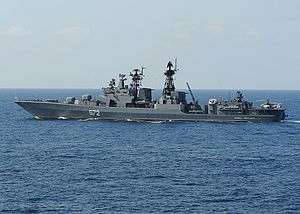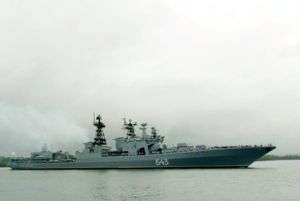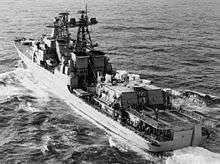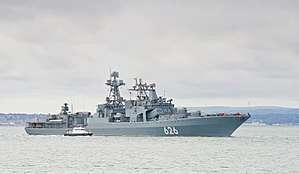Udaloy-class destroyer
The Udaloy class, Russian designations Project 1155 Fregat and Project 11551 Fregat-M (Russian: Фрегат, 'Fregat' meaning Frigate), are series of anti-submarine guided missile destroyers built for the Soviet Navy, seven of which are currently in service with the Russian Navy. Twelve ships were built between 1980 and 1991, while the thirteenth ship built to a modified design, known as Udaloy II class, followed in 1999. They complement the Sovremennyy-class destroyers in anti-aircraft and anti-surface warfare operations.
 Admiral Vinogradov underway | |
| Class overview | |
|---|---|
| Name: | Udaloy class |
| Builders: | |
| Operators: | |
| Preceded by: | Sovremenny class |
| Succeeded by: | Lider class |
| Built: | 1977–1994 |
| In commission: | 1980–present |
| Planned: | 15 |
| Completed: | 13 (12 Udaloy I, 1 Udaloy II) |
| Cancelled: | 2 |
| Active: | 9 |
| Laid up: | 1 |
| Retired: | 4 |
| General characteristics | |
| Type: | Guided missile destroyer |
| Displacement: |
|
| Length: | 163 m (535 ft) |
| Beam: | 19.3 m (63 ft) |
| Draught: | 6.2 m (20 ft) |
| Propulsion: | 2 shaft COGAG, 2× D090 6.7 MW and 2× DT59 16.7 gas turbines, 120,000 hp 89.456 MW |
| Speed: | 35 kn (65 km/h; 40 mph) |
| Range: | 10,500 nmi (19,400 km; 12,100 mi) at 14 kn (26 km/h; 16 mph) |
| Complement: | 300 |
| Sensors and processing systems: |
|
| Electronic warfare & decoys: |
|
| Armament: |
|
| Aircraft carried: | 2 × Ka-27 series helicopters |
| Aviation facilities: | Helipad and hangar |
History
The Project 1155 dates to the 1970s when it was concluded that it was too costly to build large-displacement, multi-role combatants. The concept of a specialized surface ship was developed by Soviet designers. Two different types of warships were laid down which were designed by the Severnoye Design Bureau: Project 956 destroyer and Project 1155 large anti-submarine ship. The Udaloy class are generally considered the Soviet equivalent of the American Spruance-class destroyers. There are variations in SAM and air search radar among units of the class. Based on the Krivak class, the emphasis on anti-submarine warfare (ASW) left these ships with limited anti-surface and anti-air capabilities.
In 2015, the Russian Navy announced that five out of the eight Project 1155 ships will be refurbished and upgraded as part of the Navy modernization program by 2022. In addition to overhauling their radio-electronic warfare and life support systems, they will receive modern missile complexes to fire P-800 Oniks and Kalibr cruise missiles.[2] The ships are to have their service life extended by 30 years until sufficient numbers of Admiral Gorshkov-class frigates are commissioned. Upgrades will include replacing the Rastrub-B Silex missiles with 3S-24 angling launchers fitted with four 3S-34 containers using the 3M-24/SS-N-25 Switchblade anti-ship missile, and two 3S-14-1155 universal VLS with 16 cells for Kalibr land attack, anti-ship, and anti-submarine cruise missiles in place of one of the AK-100 guns.[3]
Udaloy II
Following Udaloy's commissioning, designers began developing an upgrade package in 1982 to provide more balanced capabilities with a greater emphasis on anti-shipping. The Project 1155.1 Fregat II Class Large ASW Ship (NATO Codename Udaloy II) is roughly the counterpart of the Improved Spruance class; only one was originally completed, but in 2006 Admiral Kharlamov was reported to have been upgraded to a similar standard. In April 2010 Severnaya Verf shipyard announced that the destroyer Vice-Admiral Kulakov, which had been retired in 1990, was being upgraded to Udaloy II standard and has since resumed patrolling in 2013.
Similar to Udaloy externally, it was a new configuration replacing the SS-N-14 with SS-N-22 "Sunburn" (Moskit) anti-ship missiles, a twin 130 mm gun, UDAV-1 anti-torpedo rockets, and gun/SAM CIWS systems. A standoff ASW capability is retained by firing SS-N-15 missiles from the torpedo tubes.
Powered by a modern gas turbine engine, the Udaloy II is equipped with more capable sonars, an integrated air defense fire control system, and a number of digital electronic systems based on state-of-the-art circuitry. The original MGK-355 Polinom integrated sonar system (with NATO reporting names Horse Jaw and Horse Tail respectively for the hull mounted and towed portions) on Udaloy-I ships is replaced by its successor, a newly designed Zvezda M-2 sonar system that has a range in excess of 100 kilometres (62 mi) in the 2nd convergence zone.[4] The Zvezda sonar system is considered by its designers to be the equivalent in terms of overall performance of the AN/SQS-53 on US destroyers, though much bulkier and heavier than its American counterpart: the length of the hull mounted portion is nearly 30 meters. The torpedo approaching warning function of the Polinom sonar system is retained and further improved by its successor.
Operational history
In 2008 Admiral Chabanenko became the first Russian warship to transit the Panama Canal since World War II.[5]
Vice-Admiral Kulakov deployed to the Mediterranean Sea from its home base in Russia's Northern Fleet in June 2014.[6][7][8]
Ships
| Name | Namesake | Laid down | Launched | Commissioned | Status | |
| Udaloy I class (Russian type BPK - Large ASW Ship) | ||||||
|---|---|---|---|---|---|---|
| Udaloy | Bold | 23 July 1977 | 5 February 1980 | 31 December 1980 | Decommissioned in 1997. Scrapped at Murmansk in 2002 | |
| Vice-Admiral Kulakov | Nikolai Mikhailovich Kulakov | 4 November 1977 | 16 May 1980 | 29 December 1981 | Modernization completed in 2010, in service with the Northern Fleet | |
| Marshal Vasilyevsky | Aleksandr Vasilevsky | 22 April 1979 | 29 December 1981 | 8 December 1983 | Decommissioned | |
| Admiral Zakharov | Mikhail Nikolayevich Zakharov | 16 October 1981 | 4 November 1982 | 30 December 1983 | Caught fire in 1992 and scrapped | |
| Admiral Spiridonov | Emil Nikolayevich Spiridonov | 11 April 1982 | 28 April 1984 | 30 December 1984 | Decommissioned in 2001. 2002 sold for scrap. | |
| Admiral Tributs | Vladimir Filippovich Tributs | 19 April 1980 | 26 March 1983 | 30 December 1985 | Caught fire in 1991, but modernised and returned to service.[9] In service with the Pacific Fleet | |
| Marshal Shaposhnikov | Boris Mikhailovich Shaposhnikov | 25 May 1983 | 27 December 1984 | 30 December 1985 | Launched after modernisation, to return into service with the Pacific Fleet in 2020 [10] | |
| Severomorsk | Severomorsk | 12 June 1984 | 24 December 1985 | 30 December 1987 | In service with the Northern Fleet | |
| Admiral Levchenko | Gordey Ivanovich Levchenko | 27 January 1982 | 21 February 1985 | 30 September 1988 | In reserve with the Northern Fleet [11] | |
| Admiral Vinogradov | Nikolai Ignatevich Vinogradov | 5 February 1986 | 4 June 1987 | 30 December 1988 | In service with the Pacific Fleet | |
| Admiral Kharlamov | Nikolay Mikhaylovich Kharlamov | 8 July 1986 | 29 June 1988 | 30 December 1989 | In reserve with the Northern Fleet [12] | |
| Admiral Panteleyev | Yuriy Aleksandrovich Panteleyev | 28 January 1988 | 7 February 1990 | 19 December 1991 | In service with the Pacific Fleet | |
| Udaloy II class | ||||||
| Admiral Chabanenko | Andrey Trofimovich Chabanenko | 28 February 1989 | 16 June 1994 | 28 January 1999 | Laid up to be repaired, planned to return to service with the Northern Fleet by 2023 [13] | |
| Admiral Basisty | Nikolai Efremovich Basistiy | 1991 | Scrapped in 1994 | |||
| Admiral Kucherov | Stepan Grigorievich Kucherov | Scrapped in 1993 | ||||
Gallery
 Admiral Levchenko (605) sailing along with USS Hue City in the North Sea, 2004
Admiral Levchenko (605) sailing along with USS Hue City in the North Sea, 2004 Marshal Shaposhnikov transiting the channel into Pearl Harbor in 2003
Marshal Shaposhnikov transiting the channel into Pearl Harbor in 2003 Admiral Panteleyev
Admiral Panteleyev Vice Admiral Kulakov in 1985
Vice Admiral Kulakov in 1985 Vice-Admiral Kulakov arriving at Portsmouth, UK in August 2012.
Vice-Admiral Kulakov arriving at Portsmouth, UK in August 2012. Vice-Admiral Kulakov arriving at Portsmouth, UK in August 2012.
Vice-Admiral Kulakov arriving at Portsmouth, UK in August 2012.- Vice-Admiral Kulakov leaving Portsmouth, UK in August 2012.
- Vice-Admiral Kulakov's upperworks and Top Plate radar.
- SS-N-14 Silex missiles aboard Vice-Admiral Kulakov.
- 100mm 70cal DP guns of Vice-Admiral Kulakov.
- Stern & flight deck of Vice-Admiral Kulakov.
References
- Противолодочные корабли, Том III, часть 1, "Корабли ВМФ СССР", Ю.В. Апалков, Санкт-Петербург, 2005
- Russian Navy to modernize five Udaloy-class (Project 1155) ASW Destroyers by 2020 - Navyrecognition.com, 23 January 2017
- Russian Navy Udaloy I-class ASW Destroyer Marshal Shaposhnikov to Receive Kalibr Missiles - Navyrecognition.com, 22 August 2017
- "Udaloy Class Anti-Submarine Destroyers - Naval Technology". Retrieved 2016-03-16.
- "Russian ship enters Panama Canal". BBC News Online. December 6, 2008. Retrieved 2008-12-06.
- Kramnik, Ilya (11 December 2009). "Russian Navy's days could be numbered". Moscow: RIA Novosti. Retrieved 7 May 2010.
- "Russian North Fleet destroyer to rejoin fleet after 18 years". Moscow: RIA Novosti. 5 April 2010. Retrieved 7 May 2010.
- "Russian Naval Destroyer Moving to Mediterranean". Moscow: RIA Novosti. 29 July 2014. Retrieved 18 August 2014.
- "Pacific Fleet Moving South". 21 September 2005. Archived from the original on 9 May 2006.
- https://ic.pics.livejournal.com/navy_korabel/63221775/120824/120824_original.jpg
- https://ic.pics.livejournal.com/navy_korabel/63221775/120824/120824_original.jpg
- https://ic.pics.livejournal.com/navy_korabel/63221775/120824/120824_original.jpg
- https://ic.pics.livejournal.com/navy_korabel/63221775/120824/120824_original.jpg
External links
| Wikimedia Commons has media related to Udaloy class destroyers. |